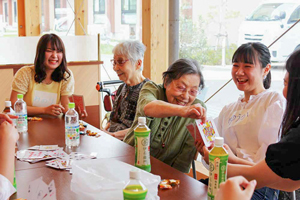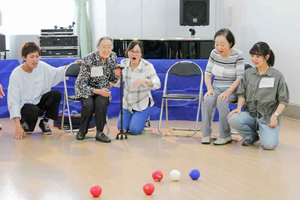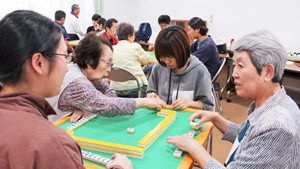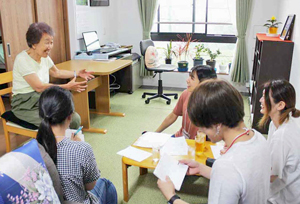College of Health and Welfare students learn about intergenerational communication
Students in J. F. Oberlin University’s College of Health and Welfare are learning how to communicate more effectively with people of other generations in a course called “Welfare Management Practice A (Interpersonal Support).” At the same time, the course teaches them about CCRC. The course is taught by Professor Tomoko Nomura and Assistant Professor Asumi Tomita.

Short for “Continuing Care Retirement Community,” CCRCs are becoming common in the U. S. A.: residents move in while they’re still healthy and able to take care of themselves, receiving progressively more help as they age. In Japan, too, the government has proposed the concept of “Japanese-style CCRCs” as part of its goal of creating communities in which people can be active for their entire lives. It has started to set up CCRCs in many places; they’re known here as “Sa-ko-ju,” the abbreviation of a Japanese phrase meaning roughly “Assisted living facilities for senior citizens,” and they differ from traditional homes for the elderly in that residents move in even before they start to need care.

On Monday, June 17, about 30 second-, third-, and fourth-year students from the College of Health and Welfare visited one such “Sa-ko-ju,” Obirin Garden Hills. They spent the first part of their day building friendships—playing various games and singing karaoke—with the 20 or so residents, who ranged in age from 70 to 92. Second-year student Yuki Harada commented, “They had a very positive outlook, and it was easy to talk with them. Above all, I was happy to see them smiling so much.” The students next spent some time writing about their experiences in their field notes and then discussed them, deciding in the end that they needed time to ask questions directly to the residents.

Two weeks later, on Monday, July 1, the students returned to Obirin Garden Hills, this time splitting into groups, each of which visited one apartment to interview its resident. The students posed such questions as, “Why did you decide to live at Obirin Garden Hills?” and “What is an average day like for you?” and the resulting conversations covered a wide range of topics. Students’ comments afterwards included, “I expected the residents to say that they spent most of their time inside the facility, but I was surprised to hear that they get out regularly” and, “There are some married couples living together happily in the facility; when I’m that age, I’d like to live like that, too.” The conversations were quite stimulating, teaching the students about older people’s daily lives and about the differing values of different generations.

Later, a resident of the facility commented, “One of the reasons I decided to move in here was the chance to interact with students and other neighbors. People of our age usually get few opportunities to talk with young people, so I was really happy to have this chance.” Using the information collected in their interviews, the students will next write reports on the theme of “Interacting with senior citizens: what I’ve learned from my classes, my friends, and the residents of Obirin Garden Hills,” further deepening their understanding of this topic.
For more information
Office of Public Relations (042-797-9772)
